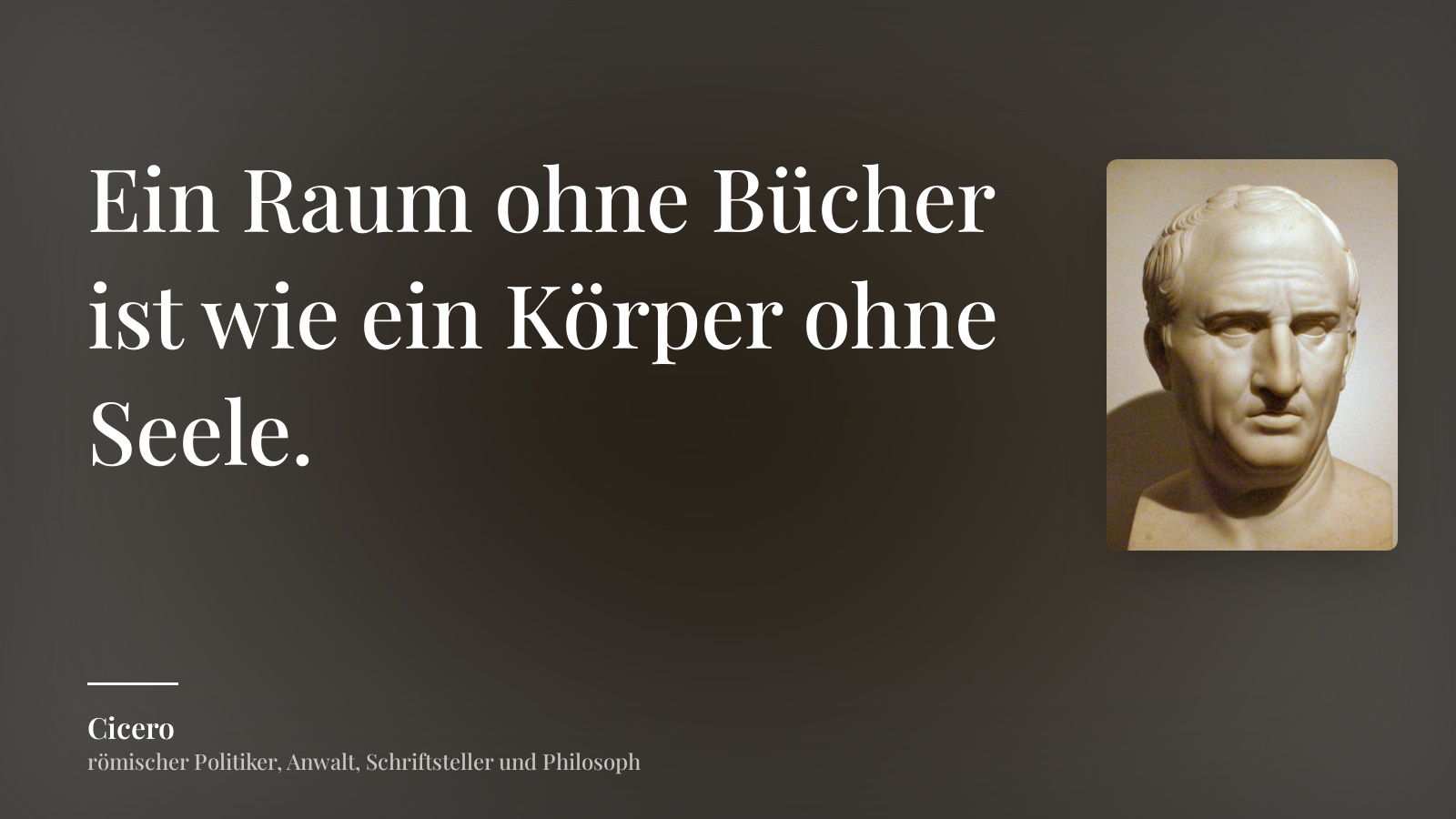
„Du hast keine Seele. Du bist eine Seele. Du hast einen Körper.“
http://www.die-tagespost.de/Archiv/titel_anzeige.asp?ID=2787 tagespost.de
lat.: "Ut conclave sine libris, ita corpus sine anima."
Zugeschrieben
Variante: Ein Zimmer ohne Bücher ist wie ein Körper ohne Seele.
A room without books is like a body without a soul.
Attributed to Cicero in J. M. Braude's Speaker's Desk Book of Quips, Quotes, & Anecdotes (Jaico Pub. House, 1966), p. 52.
Dennis McHenry in a 2011 post at theCAMPVS.com http://thecampvs.com/2011/08/03/cicero-on-books-and-the-soul/ identified a source for the exact form of words in the essay "On the Pleasure of Reading" http://books.google.com/books?id=0YfQAAAAMAAJ&dq=cicero%20%22room%20without%20books%22%20%2B%22contemporary%20review%22&pg=PA240#v=onepage&q&f=false by Sir John Lubbock, published in The Contemporary Review, vol. 49 (1886) https://archive.org/details/contemporaryrev55unkngoog, pp. 240–51 https://archive.org/stream/contemporaryrev55unkngoog#page/n250/mode/2up, in which Lubbock wrote that "Cicero described a room without books as a body without a soul" (p. 241). The same sentence may also be found on p. 61 https://archive.org/stream/thepleasuresofli01lubbuoft#page/60/mode/2up of Lubbock's collection The Pleasures of Life. Part I. 18th edition (London and New York : Macmillan and Co. 1890) https://archive.org/details/thepleasuresofli01lubbuoft, in a lecture titled "A Song of Books". McHenry suggested that Lubbock may have had in mind the words "postea vero quam Tyrannio mihi libros disposuit mens addita videtur meis aedibus" at Cicero, Ad Atticum 4.8, which are translated by E. O. Winstedt on p. 293 https://archive.org/stream/letterstoatticus01ciceuoft#page/292/mode/2up of Cicero: Letters to Atticus I (London : William Heinemann, and New York : G. P. Putnam's Sons 1912) https://archive.org/details/letterstoatticus01ciceuoft "Since Tyrannio has arranged my books, the house seems to have acquired a soul", and by Evelyn Shuckburgh on p. 234 https://archive.org/stream/cu31924012541433#page/n283/mode/2up of The Letters of Cicero. Vol. I. B. C. 68–52 (London : George Bell and Sons 1908) https://archive.org/details/cu31924012541433 "Moreover, since Tyrannio has arranged my books for me, my house seems to have had a soul added to it" (although the Latin word " mens http://athirdway.com/glossa/?s=mens", rendered "soul" by both Winstedt and Shuckburgh, is more usually translated by the English "mind"). D. R. Shackleton Bailey in Cicero's Letters to Atticus (Harmondsworth : Penguin Books 1978), p. 162, translated "And now that Tyrannio has put my books straight, my house seems to have woken to life".
Disputed
Variante: Ut conclave sine libris ita corpus sine anima" A room without books is like a body without a soul

„Du hast keine Seele. Du bist eine Seele. Du hast einen Körper.“
„Der Körper ist das Grab der Seele.“
Gorgias 493a2-3, (wahrscheinlich ein Zitat von Pythagoras)
Original altgriech.: "τὸ μὲν σῶμά ἐστιν ἡμῖν σῆμα·"; sprich: "To men soma estin hemin sema."; wörtlich: "Der Körper ist für uns ein Grab."
„Die menschliche Seele hat ihre Lebensalter wie der Körper.“
Journal meiner Reise im Jahr 1769
Journal meiner Reise im Jahr 1769
„Freundschaft, das ist eine Seele in zwei Körpern.“
„Leben ohne Freiheit ist wie ein Körper ohne Seele.“
„Unser Körper ist die Harfe unserer Seele.“
„Musik ist für die Seele was Gymnastik für den Körper.“
„Raum, ihr Herrn, dem Flügelschlag // Einer freien Seele!“
Aus den Bergen, S. 49, [herwegh_gedichte02_1843/59]
Gedichte eines Lebendigen, Band 2 (1843)








